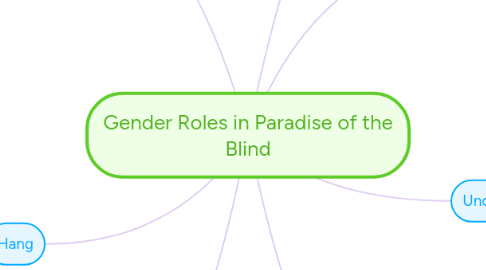
1. Aunty Tam
1.1. "The mob would have knocked it down if Aunt Tam hadn't thrown herself in front of them." #34
1.1.1. This is Aunt Tam's first act of defiance as she stands up for her sister-in-law against an entire village. Already an outcast, she still goes against society to stand up for what she believes in. Especially being a woman in Vietnamese society, it is remarkable that she has the courage to do this.
1.2. "My aunt was very beautiful, but since she was educated and aloof, she couldn't seem to find a husband." #22
1.2.1. Huong is suggesting that women in Vietnam have to fit a very specific criteria to be considered a real woman, eligible for marriage. It also suggests that the sole role of women is to get married and they don't have any other purpose in life. Being educated is frowned upon rather than celebrated. Additionally, the phrasing of the sentence suggests that the woman should just be beautiful and nothing else.
1.3. "You must obey," #99 Aunty Tam -> Hang
1.3.1. Aunty Tam is very authoritative and direct, which is very unlike that of a traditional Vietnamese woman. Because of her education and upbringing, she is taught to be very boisterous and in the Vietnamese context, man like.
1.4. Aunt Tam is a direct comparison to Aunty Ifeoma in Purple Hibiscus as they're both educated women in a society where they're not considered the norm or generally accepted. They are often taunted or mocked regarding their education.
1.5. Aunt Tam is also similar to Aunty Chinh in a sense, because neither of them is reliant on a man for support.
2. Ton (Hang's father)
2.1. Hang's father defied gender roles and stereotypical norms in many ways
2.2. "Motioned to my mother to comeback inside, and then left for his own mother's house." #22
2.2.1. A very "unmanly" action, leaving one's home for one's mothers in the face of challenges. A man, especially in an Asian context, is meant to take care of his family and protect them however Ton left the scene as soon as he could.
2.3. "'My brother had to leave. He would never have survived this humiliation.'" #31
2.3.1. Again Ton is unable to live up to society's expectations of "being a man" and he runs away from the situation instead of facing it. Aunty Tam in fact takes up more of a role of man.
3. Constructive argument
3.1. Houng employs gender roles as a topic through out the novel to chart how characters change over the course of the novel. Some characters, such as Uncle Chinh and Que, are used as stereotypical characters which fit into the traditional side of Vietnamese society while other characters such as Aunt Tam and Ton defy gender roles.
3.2. Huong explores how the political and social expectations of society shape gender roles in the characters in this novel.
4. Hang
4.1. Hang progresses over the book from a young, timid girl who generally conforms to gender based expectations to an independent woman who defies cultural and societal expectations
4.2. "I exploded, 'You've given me my life, Mother. But the truth is the truth." #189
4.2.1. In context of the Vietnamese lifestyle, it is unheard of for children to speak against their parents however Hang, a girl, has the courage to do that which is striking. Huong may be trying to make a larger commentary on how as modernization occurs and the youth shy away from the Communist rule, they start to develop traditionally Western values too,
4.3. "I'm going to sell this house and leave it all behind." #258
4.3.1. Most significant decision that Hang has made as it completely defies what is expected of her. As a girl, she should be used to taking orders and not stepping out of line but the fact that she makes her own decisions is fantastic.
4.4. Hang's character is comparable to that of Kambili. Since both novels are bildungsroman texts, focusing on these two characters as the protagonists, they chart the progression of their characters. In both the cases, the girls start of being submissive to either their familial expectations and societal/cultural, but develop a fuller sense of who they are as the novel reaches and end. The stark difference between the two is that Kambili chooses a more hybrid ending, choosing a middle ground while Hang retaliates and becomes very independent.
5. Uncle Chinh
5.1. "He is the only male heir. We're always bent to his will." #96
5.1.1. This quote shows how men in Vietnamese context are very domineering and despite their age in a household, attain absolute power. Que in this quote is also shown as very feeble and submissive, further reiterating the stereotypical gender roles.
5.1.2. This is similar to Papa Eugene in Purple Hibiscus who expects absolute power in his household and doesn't allow anyone to question his view.
5.2. "Uncle Chinh minced the meat with an expert hand." #206
5.2.1. The end of the novel shows a stark change in Uncle Chinh's portrayal. As he is cooking, he has taken up traditionally mroe feminine tasks. This suggests that Houng is showing that alongisde the youth, the older rigidly Communist leaders have also moved on with the time, or mocking the entire Communist rule in the first place, seeing that this is what a political leaders are diminished to.

